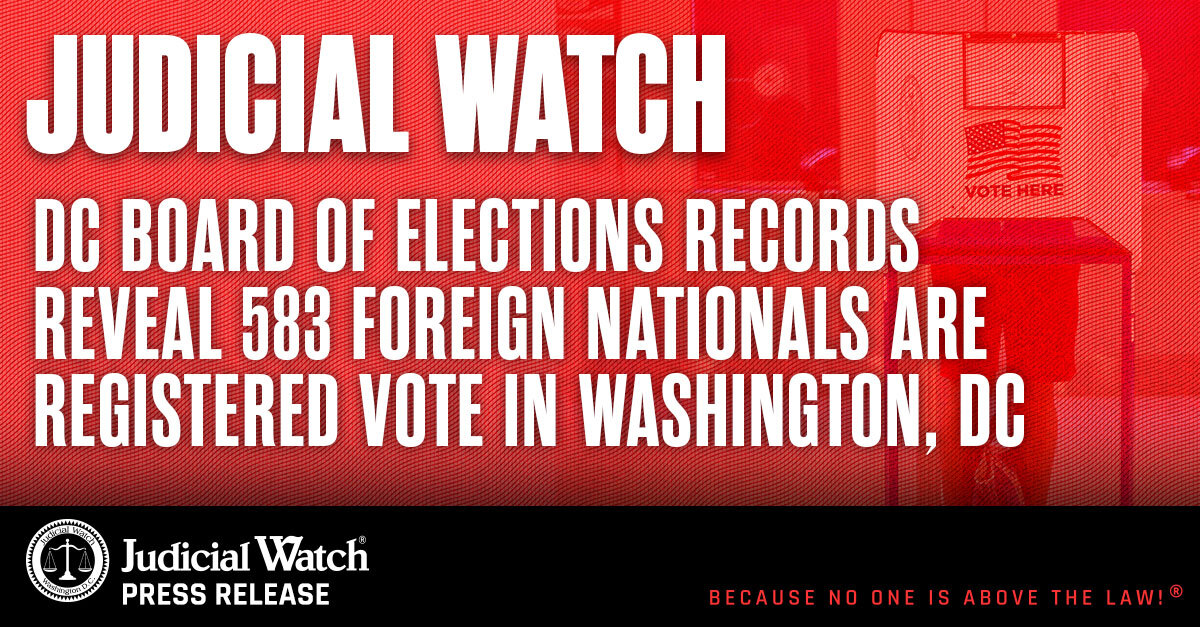

Judicial Watch and Allied Educational Foundation File Amici Brief, Ask U.S. Supreme Court to Overturn Texas Voting Districting
(Washington, DC) – Judicial Watch and the Allied Educational Foundation (AEF) announced today that they filed an amici curiae brief in the U.S. Supreme Court in support of Sue Evenwel, a Texas resident, due to concerns with “malapportionment” in a Texas election districting law that weakens the voting rights of citizens by including nonvoting noncitizens in districts (Sue Evenwel, et al. v. Greg Abbott, et al. (No. 14-940). The Supreme Court brief was filed on August 7.
The Texas districting law draws up districts for the Texas state senate based upon total population rather than the number of eligible voters. As a result, voters in districts with large numbers of non-voting-eligible aliens have increased voting and political power compared to voters in districts with higher numbers of legal residents. Voters in Texas’ urban centers have substantially inflated voting power over the lesser number of eligible voters who also reside in those districts. The situation is particularly acute in urban areas like Dallas and Houston, where up to 50 percent of the voting age population are not U.S. citizens.
The Judicial Watch-AEF brief argues that the districting law almost cuts in half the voting power of some Texas citizens:
Texas created districts that are equal in total population but decidedly unequal in citizen population. As a result, the votes of some of Texas’ citizens have, by some measures, almost twice the electoral power of the votes of other Texas citizens …
Texas’ legislators … argue that they are complying with the constitutional, “one person, one vote,” requirement, at the very moment that they are “weighting” the votes of their supporters by placing them in districts with greater numbers of nonvoting noncitizens. The ultimate consequence of this scheme is that legislators are able to enhance their odds of winning reelection without having to engage in the bothersome and time-consuming task of actually persuading voters to vote for them.
In June 2014, Texas citizens Sue Evenwel and Edward Pfenninger filed a lawsuit suit arguing that the law violated the “one person, one vote” clause of the Fourteenth Amendment. On November 5, 2014 a special panel of three federal court judges dismissed the suit, and on December 4, 2014, Evenwel and Pfenninger filed their notice of appeal to the Supreme Court. On March 6, 2015 Judicial Watch and AEF filed an amici brief in support of what turned out to be a successful effort to persuade the Supreme Court to take up the lawsuit.
The Judicial Watch/AEF brief recommends that the Supreme Court “enjoin the use of Texas’ Senate districts because they embody and rely on citizen malapportionment. Further, this Court should direct that Texas’ Senate districts be apportioned on the basis of citizen voting-age population.”
This Texas state legislative districting case has national policy implications because congressional districts are also drawn in a way that gives undue voting weight to voters in districts with large alien and ineligible voting age populations. For example, if only eligible citizen voters could be counted when creating congressional districts many of the nation’s sanctuary cities with large immigrant non-citizen populations could have their electoral power reduced.
“In Texas, some voters are given one-half a vote simply they live in areas that don’t have many illegal aliens and other non-citizen residents. The Supreme Court should apply the law to ensure record numbers of non-citizens in the United States aren’t used to deprive citizens of their right to have their votes treated equally under law,” said Judicial Watch President Tom Fitton. “This Texas redistricting case exposed the dirty little secret that the illegal immigration crisis is being used by politicians to gain power at the expense of the voting rights of U.S. citizens.”
The Allied Educational Foundation, Judicial Watch’s partner in the amici brief, is a charitable and educational foundation dedicated to improving quality of life through education. In furtherance of that goal, the Foundation has engaged in a number of projects which include, but are not limited to, educational and health conferences domestically and abroad. AEF has frequently partnered with Judicial Watch to fight government and judicial corruption, and to promote a return to ethics and morality in the nation’s public life.














